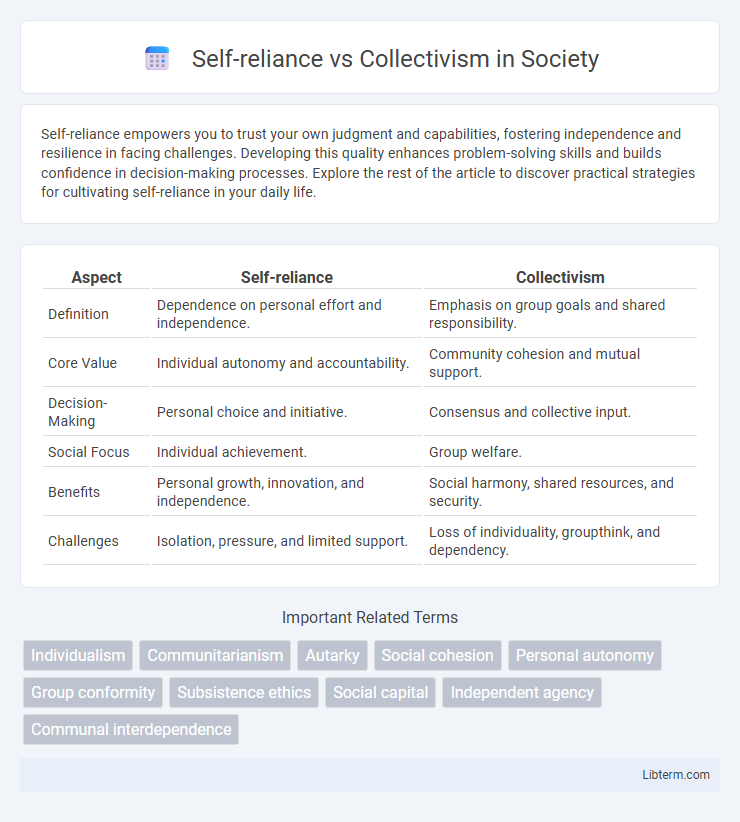Self-reliance empowers you to trust your own judgment and capabilities, fostering independence and resilience in facing challenges. Developing this quality enhances problem-solving skills and builds confidence in decision-making processes. Explore the rest of the article to discover practical strategies for cultivating self-reliance in your daily life.
Table of Comparison
| Aspect | Self-reliance | Collectivism |
|---|---|---|
| Definition | Dependence on personal effort and independence. | Emphasis on group goals and shared responsibility. |
| Core Value | Individual autonomy and accountability. | Community cohesion and mutual support. |
| Decision-Making | Personal choice and initiative. | Consensus and collective input. |
| Social Focus | Individual achievement. | Group welfare. |
| Benefits | Personal growth, innovation, and independence. | Social harmony, shared resources, and security. |
| Challenges | Isolation, pressure, and limited support. | Loss of individuality, groupthink, and dependency. |
Defining Self-Reliance and Collectivism
Self-reliance is the principle of relying on one's own capabilities, judgment, and resources to meet personal needs and solve problems independently. Collectivism emphasizes the prioritization of group goals, shared responsibilities, and interdependence among members within a community or society. Defining these concepts highlights the contrast between individual autonomy and communal cooperation in social and cultural contexts.
Historical Roots of Individualism and Community
The historical roots of individualism trace back to Enlightenment thinkers such as John Locke, who emphasized personal liberty and self-reliance as foundations of human rights and democracy. In contrast, collectivist traditions, deeply embedded in societies influenced by Confucianism and Indigenous communal practices, prioritize group cohesion, social harmony, and shared responsibilities. This dichotomy shaped Western emphasis on individual autonomy versus Eastern and Indigenous emphasis on community interdependence.
Psychological Foundations of Self-Reliance
Self-reliance stems from intrinsic motivation, fostering autonomy, self-efficacy, and resilience essential for individual psychological well-being. It emphasizes internal locus of control, encouraging individuals to trust their judgment and capabilities despite external challenges. Contrasting collectivism, self-reliance underlines personal responsibility and independent problem-solving as foundations for mental health and adaptive functioning.
The Social Benefits of Collectivism
Collectivism fosters social cohesion and shared responsibility, enhancing community well-being through mutual support and cooperation. It encourages the pooling of resources and collective problem-solving, resulting in increased resilience during economic or social challenges. Social networks within collectivist societies provide emotional security and promote equality, reducing individual stress and improving overall societal health.
Economic Impacts: Independence vs. Cooperation
Self-reliance promotes economic independence by encouraging individual entrepreneurship and resource control, leading to innovation and efficient allocation of resources. Collectivism fosters economic cooperation through shared goals and pooled resources, which can enhance resilience and equitable distribution of wealth. Balancing self-reliance and collectivism is crucial for sustainable economic growth and social stability.
Education Systems: Fostering Autonomy or Teamwork
Education systems emphasizing self-reliance prioritize individualized learning, critical thinking, and personal responsibility, fostering autonomy and independent problem-solving skills. In contrast, collectivist-oriented education encourages collaboration, group projects, and communal goals, enhancing teamwork, social cohesion, and cooperative learning. Balancing these approaches can optimize cognitive development and social adaptability by cultivating both independent initiative and effective group interaction.
Cultural Perspectives on Independence and Solidarity
Self-reliance emphasizes individual autonomy and personal responsibility, often rooted in Western cultural values that celebrate independence as a pathway to self-fulfillment and innovation. Collectivism prioritizes group cohesion and interdependence, reflecting cultural perspectives common in many Asian, African, and Indigenous societies where solidarity and shared responsibility strengthen social bonds and community resilience. Understanding these cultural frameworks reveals how values around independence and solidarity shape social behavior, decision-making, and conflict resolution.
Self-Reliance and Collectivism in Crisis Situations
Self-reliance in crisis situations emphasizes individual responsibility, quick decision-making, and resourcefulness, enabling people to adapt independently to emergencies. Collectivism fosters cooperative efforts, shared resources, and mutual support, enhancing resilience through community solidarity and collective problem-solving. Studies show that combining self-reliance with collectivist strategies improves overall crisis response effectiveness by balancing personal initiative and communal strength.
Balancing Individual and Collective Interests
Balancing individual self-reliance with collectivism requires acknowledging the importance of personal autonomy while promoting social cooperation and shared responsibilities. Emphasizing self-reliance encourages innovation, resilience, and personal growth, whereas collectivism strengthens community support, resource distribution, and social harmony. Effective societal models integrate both perspectives by fostering environments where individual ambitions align with collective well-being to achieve sustainable development and mutual prosperity.
The Future of Societies: Toward Integration or Division
Self-reliance encourages individual empowerment and innovation, fostering adaptive capacities crucial for future societal resilience. Collectivism emphasizes community solidarity and shared resources, promoting social cohesion and collective welfare in evolving global challenges. The future of societies likely hinges on balancing these paradigms, integrating personal autonomy with collaborative frameworks to navigate complex cultural, economic, and environmental shifts.
Self-reliance Infographic

 libterm.com
libterm.com